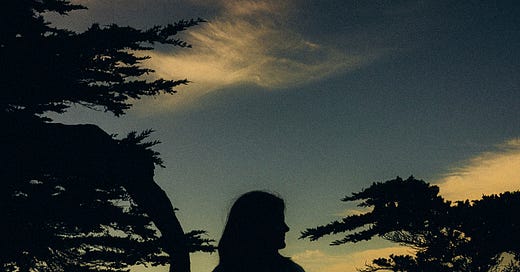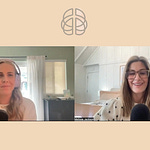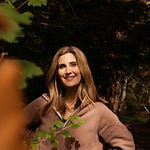I'm in this space with you guys where, as things come up for me that I feel we all are experiencing but maybe don't fully understand yet, I'm sharing it with you.
I'm speaking at it from curiosity, “ah-has,” and moments of insight I've had in my own life, and ways I've connected the dots in a powerful way that I want to share with you in hopes that it might support you in connecting dots as well.
Holding onto Unhealed Trauma
Today, I'm connecting the dots around this concept of trauma. We know as neurodivergent people we're redirected 40 more times than neurotypicals, Dr. Susan Baum says.
As children who didn't quite fit into the box in the classroom, we may carry those moments of feeling embarrassed or humiliated for being called on and not knowing how to read the passage. We may have felt so anxious in anticipation of not knowing how to read the passage that it impacted our ability to read it. We may have had our heads in the clouds, daydreaming, and we didn't know the next step.
What Dr. Gabor Maté says is that trauma is not just the event that happens — it's not only that moment in class of feeling humiliated. It's what we make that moment mean about ourselves.
[Trauma is] the stories we create internally that we hold in our bodies, that our nervous system responds to, that we carry with us moving forward into our lives.
And so the dots that I'm connecting right now are that we tend to make decisions from these parts of us. So if there's part of ourselves that feels unworthy, that we feel ashamed about, that we feel isn’t good enough, we often make choices according to those parts of us.
Operating with Unhealed Trauma
And I'm just starting to see this as how these pockets of unhealed trauma within us can still be running the show without us being fully aware of it.
It can contribute to self-sabotage because maybe we desire something bigger for ourselves. When something lights us up and excites us, we may not take action in the ways that lead to what we desire because we're still operating from those parts of ourselves that believe we're not worthy of achieving it or capable of achieving it.
It's just really coming up for me how important it is to heal these parts of ourselves, to really get honest and look at these parts of ourselves, to feel uncomfortable feelings, to show up for that inner us, that inner child that still believes that we're incapable or unworthy and carries shame around these moments of trauma in our bodies.
What did we decide about ourselves based on these events? Like when our parent or caregiver was emotionally unavailable and not attuned to our needs, and we were left alone in our rooms to cry it out. Or our needs and feelings were invalidated and dismissed.
I know that most people in my age bracket are lucky if they have parents who are emotionally aware and mature, attuned to their needs and feelings, and able to hold space for their feelings. Because their generation wasn't given the tools by their parents, our parents weren't held during their big emotions. They weren't seen and validated in their experiences.
And so they shut off those things. Their coping mechanism was to not feel because that got them negative attention. And they had their own trauma that they were parenting from.
Breaking the Cycle of Past Generations
That's where the cycle breaking comes in and the importance of seeing these traumas for what they are.
Because we just keep passing these bad habits down when none of us are conscious of them. We're all on the receiving end of someone who is unavailable to love us in the way we need.
Even though people have the best of intentions if their trauma is unhealed, they're still responding to the world from those unhealed parts of themselves.
I think so many of us feel like we're the cycle breakers in our family lineage. Maybe sometimes we feel like the black sheep, the odd man out. We see things and feel things in a way that others don't.
And it can be so isolating and hard and poke those wounds of feeling misunderstood, of feeling unseen, of feeling alone.
Breaking the Cycle for Future Generations
And yet we're really called to do this work. To shift things for our children and for future generations.
They say when we heal ourselves — when we heal that mother wound, that father wound — we heal seven generations forwards and backward.
I just want to acknowledge how stinking hard it is to move through that process, especially when we often don't receive much support from the people we love and who we want to see us and validate us.
And so, we have to see ourselves. We have to validate ourselves. We have to give ourselves all the things that we wished our parents would have given us, but they were unable to because their parents didn't give it to them.
And that's where breaking the cycle begins.
It’s empowering - we've been tasked with this honor, this responsibility to gift this to our lineage. To gift this to our children and our children's children. To switch the patterns of autopilot parenting from trauma.
Breaking the Cycle through Healing Work
So often, we're moving forward in our lives, our professions, and our relationships from these places of limiting beliefs. When we can heal those, come back to what is true, and hold ourselves as that loving parent that we so desperately needed when we were hurting in our own childhood, it changes so much. Not just for ourselves but for our children and future generations.
I'm starting to really look at this trauma and healing work in a new way because, let's be honest, we all carry trauma. It's not just the big Ts — the big, huge, significant, horrible events that we as a society recognize as trauma. It's also those little Ts that happened to all of us and what we make those mean about ourselves. It’s how we take action from those places within us that can keep us stuck and don’t allow us to show up in the ways we really desire.
So I'm just curious what you think about this?
Like I said, I'm in this place of loving to share with you when I connect some dots in hopes that it sparks a new perspective within you.
Let's co-regulate in community through our shared experience. We can really see and validate one another because the truth is we're more alike than we're different. And the more we can be open and honest and share what we're learning with one another, we can heal ourselves and each other.

















Share this post